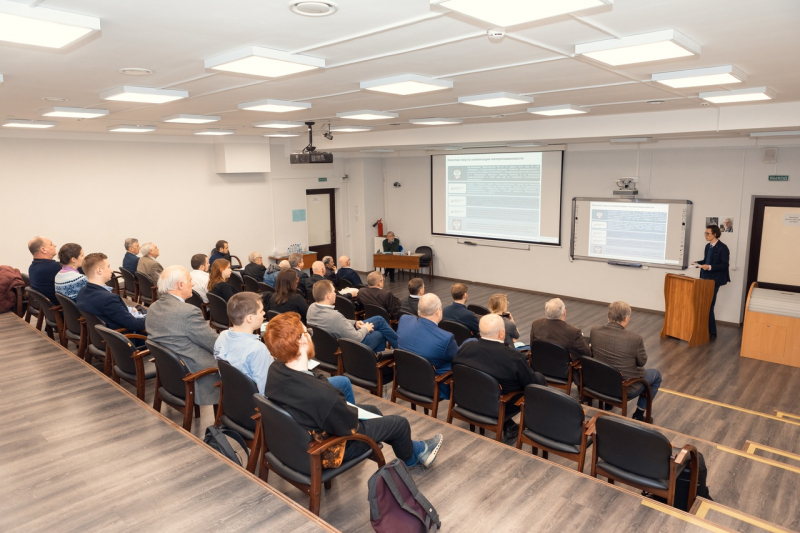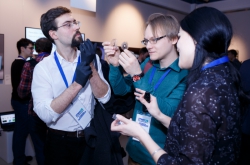Igor Baranov, the Dean of ITMO University’s School of Biotechnology and Cryogenic Systems
The conference was created to help establish new opportunities of minimizing the role that the refrigeration industry plays in global warming. It brings together not only our own students, but also specialists from all over Russia as well as international experts. Oleg Tsvetkov, who moderated the discussion, has been studying this problem since the 1970s and is an acclaimed expert in the field. We are happy to host such an event at our department.
Global warming is a well-known and actively discussed issue. The fact is that it is not only a social or economic issue, it also affects our energy consumption. With the temperature rising, we have to intensify our air-conditioning, thus raising the global energy consumption levels.

The cooling agents used in various air-conditioning and refrigeration systems are one of the main factors contributing to global warming. These agents in particular add to the greenhouse effect.
At the School of Biotechnology and Cryogenic Systems we develop energy usage reduction solutions. Energy consumption leads to atmospheric CO2 emissions, which affect the environment – and that is why we aim to create energy-efficient technologies. This is how we see our contribution to solving global environmental problems.
Some of our projects involved connecting buildings up to renewable energy sources without any connection to centralized energy systems. We chose to work with heat energy created by heat pumps as our renewable energy source. There are also projects that use secondary heat. Some facilities in the central and north-western regions are already operating on this kind of energy.

Oleg Tsvetkov, ITMO University Professor
Global warming means we have to use air-conditioning more often. Summer starts earlier and earlier in the year, and it is not uncommon for the energy supply systems in southern cities to overload leading to blackouts.
Information technologies are rapidly developing and the number of data centers keeps growing. These centers already consume 2% of global electricity, half of which is used in cooling systems. By 2030, their global electricity consumption will reach 8%.
That is why we pay so much attention to energy-efficient systems. There is an acute need for effective refrigeration.

Refrigeration used to only be applied to food items and air conditioners before, but these days cooling agents are applied in energy production. They are used instead of water on hydroelectric generating stations, because they emit the same kind of steam needed to spin the turbine. Any cooling agent can be used, but the most common one currently is hydrofluoroolefin, which does damage the ozone layer. In the near future, however, more eco-friendly CO2 and ammonia will take its place. This technology has only recently been introduced in Russia, but it is already actively used around the globe. It is a very prospective field, as it means that the “cold” produces energy for itself, becomes self-sufficient, which has both economic and environmental benefits.

Boris Babakin, Moscow State University of Food Production
Refrigeration industry is very important around the world. The main trends in the field were defined at the 25th IIR International Congress of Refrigeration in Montreal held in August of 2019. Naturally, global warming is on the agenda. Refrigeration itself is life, but some of the cooling agents emitted into the atmosphere cause the so-called greenhouse effect and damage the ozone layer. These days there are a lot of new environmentally friendly alternatives.
For instance, the primary cooling agents used nowadays are obtained naturally, like isobutane, propane and mixed natural cooling agents. Liquid CO2 and ammonia also have a lot of potential. Countless shopping malls in the USA and EU already function on ammonia. It has zero effect on the ozone layer.

A lot of attention is paid to energy usage reduction. Refrigeration industry consumes around 20% of the world’s electricity, while 8% is consumed by air-conditioning systems and 4% is needed to keep the roughly 2 billion household refrigerators in use today.
The food industry, however, is yet to develop energy-efficient solutions, as it also is one of the major global energy consumers. Some of the most prospective refrigeration methods are electrophysical and it precisely what we work with at ITMO. If we combine electricity and refrigeration, we often get very interesting results. This method improves the heat exchange, lowering energy consumption.
The problem is that the government doesn’t pay enough attention to this field. Laboratories have to be funded in order for our students to have more research projects.

Alexander Baranenko, the president of the International Academy of Refrigeration
The International Academy of Refrigeration is an internationally acclaimed organization. It consists of 1,800 members from 36 countries. The main purpose of the Academy is in bringing together experts from the fields of refrigeration technologies and food storage technology to tackle the crucial issues and challenges of these fields.

According to the International Institute of Refrigeration located in Paris, France, cryogenic technologies consume around one-fifth of the world’s electricity. This number will double by 2050. One has to keep in mind, however, that there is a global tendency of electricity consumption increase. Thus, this estimate doesn’t mean that cryogenic technologies will consume 40% of global electricity.
But the main trend in the field is working towards increased energy efficiency and environmental security. It is important to keep promoting the practices applied around the world and to fund the key research fields, which can help reach these goals.






